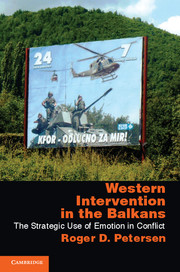Book contents
- Frontmatter
- Contents
- Acknowledgments
- Part 1 Background and Theory
- Part 2 Cases and Tests
- 7 Background to Western Intervention in the Balkans
- 8 The Case of the Roma in Kosovo
- 9 Background to Kosovo
- 10 Waiting for the West
- 11 Kosovo Intervention Games, I
- 12 Kosovo Intervention Games, II
- 13 Kosovo Conclusions
- 14 South Serbia
- 15 Macedonia
- 16 Bosnia
- 17 Montenegro
- 18 Conclusion
- Appendix A A Note on Names
- Appendix B Alternative Arguments
- References
- Index
- References
16 - Bosnia
from Part 2 - Cases and Tests
Published online by Cambridge University Press: 05 June 2012
- Frontmatter
- Contents
- Acknowledgments
- Part 1 Background and Theory
- Part 2 Cases and Tests
- 7 Background to Western Intervention in the Balkans
- 8 The Case of the Roma in Kosovo
- 9 Background to Kosovo
- 10 Waiting for the West
- 11 Kosovo Intervention Games, I
- 12 Kosovo Intervention Games, II
- 13 Kosovo Conclusions
- 14 South Serbia
- 15 Macedonia
- 16 Bosnia
- 17 Montenegro
- 18 Conclusion
- Appendix A A Note on Names
- Appendix B Alternative Arguments
- References
- Index
- References
Summary
Questions
The Bosnian case presents several puzzles. First, why was this conflict so bloody during the war? The most reliable source, Mirsad Tokaca's “Human Losses in Bosnia-Herzegovina 1991–1995,” better known as “The Bosnian Book of the Dead,” documents at least 97,000 deaths, with hundreds of thousands displaced. Much of the violence was indiscriminate and targeted against civilians. Tokaca's figures indicate that 40 percent of the victims were civilians and that 83 percent of civilian victims were Bosniaks, compared to 10 percent Serbs and 5 percent Croats.
Second, why has more progress not been made toward the creation of a functioning, centralized state fifteen years after the signing of the Dayton Accord? What accounts for progress on some issues but not others? As outlined in the seventh chapter, the Western-brokered Dayton Accord ended the war and set up a bifurcated consociational political system. Fifteen years after the Dayton Accord was signed, Bosnia (BiH) limps along as a functioning state, but one, by all accounts, with many dysfunctional elements. By definition, states need to accomplish basic missions – establish a monopoly over violence, regulate taxation, control borders, establish property rights, field an army, maintain a judicial system. By 2010, Bosnia had managed to accomplish only some of these fundamental missions. The nature of progress toward a functional state raises some puzzles. For instance, why was Bosnia able to eventually field an army, but not to effectively centralize the police force? Why did the EU carrot not lead to more progress? As the High Representative to Bosnia, Valentin Inzko, stated in a speech to the European Parliament in January 2010, “In the last four years Bosnia has been in a political stalemate…not a single reform has been adopted that would give the state increased competences needed for active participation in the EU accession process.”
- Type
- Chapter
- Information
- Western Intervention in the BalkansThe Strategic Use of Emotion in Conflict, pp. 243 - 268Publisher: Cambridge University PressPrint publication year: 2011



